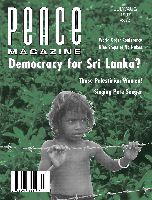
Peace Magazine Jul-Aug 1997, page 5. Some rights reserved.
Search for other articles by various here
Fidel Castro has become a symbol of resistance to the dominance of the U.S. in the hemisphere. He is, like it or not, the fundamental reason why Cuba has not become either an economic dependent of the U.S., or been subjugated politically.
To stand up to the U.S., with its vast resources, army, technological advantages and political zeal, a person or state would have to be intense and determined, prepared to "go to the wall"-to risk family, fortune, reputation, friends, and life itself. He would have to be prepared to accept fear as the motivating force for loyalty, if necessary, in order to maintain the state under his control. He would have to be intelligent, a master of political arts, aware of the needs of most people, and able to establish services to help people most of the time. He would need charisma.
All of these, Castro is.
Stalemate. On the one hand a string of U.S. administrations, determined to winkle cooperation out of Cuba by force or economic pressure, spurred on by a segment of the Cuban exile community. One the other, a stiff-necked leader determined not to let this happen. Caught in the middle of this pincer are the Cuban people.
Most observers fear what will happen when age compels Castro to surrender power. To avoid even more violence will require:
The sound economic development of Cuba. This includes a competent bureaucracy. Canada is helping Cuba undertake these steps.
A more autonomous civil society in Cuba. Canada is encouraging organizations like Physicians for Global Survival, Oxfam Canada and other NGOs to establish strong connections with counterparts in Cuba.
The majority of the exile community to act as buffer against the hostile rhetoric of the minority.
Accommodation. U.S. foreign policy must recognize the socialist government and Castro will have to surrender power to the people. How this miracle will take place is unclear, but the political will of almost all nations is against the embargo.
Warren Bell, Salmon Arm, BC
I want to tell you how much I appreciated the recent dialogue about Cuba.
Cuban achievements in fields such as health care and education have been tremendous, especially in a social climate strained by a U.S. economic blockade.
Cuba proves that citizens don't need capitalism to meet their essential needs. However, the Cuban government's poor human rights record tragically diminishes its ability to maintain its leadership.
In a report on its mission to Cuba in 1996, the Writers in Prison Committee of International PEN reports that Cuba continues to arrest writers and hold them in prison longer than almost any other country in Latin America. Many writers have been jailed for more than 10 years. (The report, Dangerous Writers: Freedom of Expression in Cuba, is available from the Writers in Prison Committee, International PEN, 9/10 Charterhouse Buildings, Goswell Road, London EC1M 7AT.)
Saul Chernos, Toronto, ON

Peace Magazine Jul-Aug 1997, page 5. Some rights reserved.
Search for other articles by various here